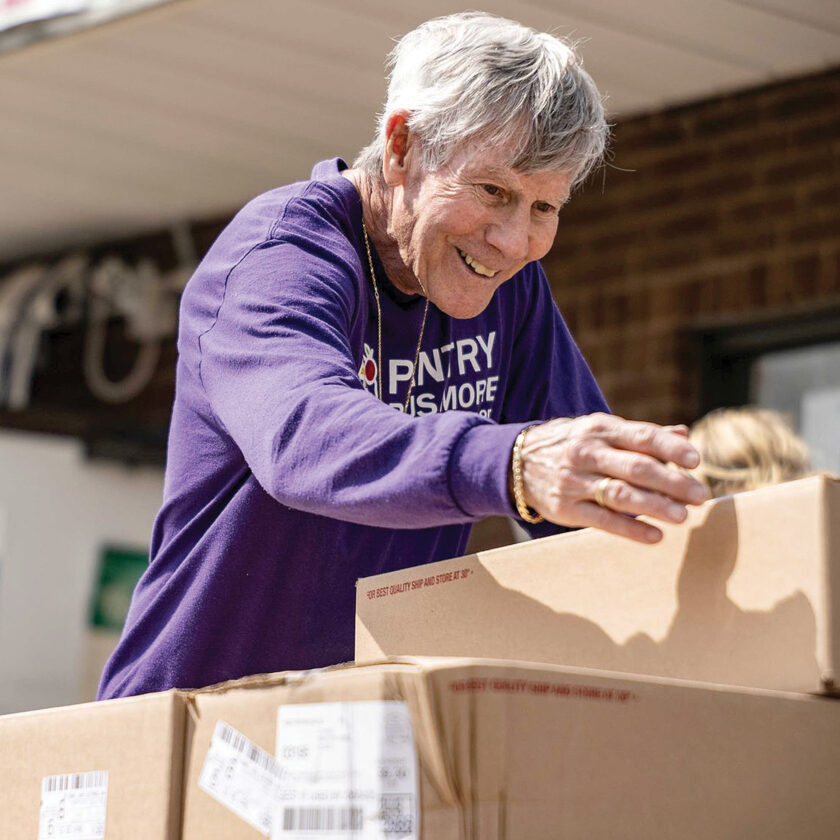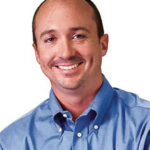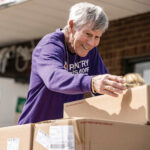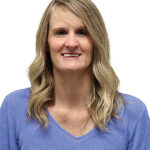Volunteers work hard easing hunger

WVU photo Mike Miller, volunteer coordinator, helps unload boxes of food to stock shelves at Pantry Plus More.
MORGANTOWN — On any given Wednesday, two one-ton white box trucks can be found sitting back-to-back on Roush Drive in Westover waiting for volunteers to unload pallets full of canned foods, packaged meats and shelf-stable milk. As those pallets are set in front of Pantry Plus More, a crew of volunteers flood out the door to strip off the plastic wrap that binds the packages of groceries and unload it onto rolling carts.
All of it will eventually end up on the handmade shelves inside, waiting for people who use the pantry to feed themselves and their families, a growing population in the Morgantown area.
Former WVU Professor Mike Miller says he was “totally ignorant” of food insecurities for much of his career teaching biochemistry. A volunteer at heart, Miller and his wife Tammy were co-presidents of Empty Bowls post-retirement and made the connection with Pantry Plus More, which was begun by high school student Roark Sizemore and his then-counselor, Tom Bloom (now the executive director of Pantry Plus More).
Sizemore started the network of food supplies after seeing some of his classmates show up at Circle of Friends’ free dinners where he was volunteering. Miller said the young man was concerned that hungry students couldn’t learn as well or as quickly as those who were well fed, and that food was essential to the learning process. Initially, Sizemore and Bloom started pantries in schools, but the operation quickly grew; however, breaks in the school year, either planned or weather-related, meant a break in food delivery, while the COVID pandemic was a further disruption.
As the Millers helped them develop a 501(c)3 nonprofit, the pantry began to grow because it became more visible in the community. The donation of a building and then a warehouse, volunteers who built shelving and distributed food, a board made up of mostly young people — all coalesced to the food and essential needs distribution visible today in Westover.
Also available on iServe, Pantry Plus More attracts WVU students who need some 400 volunteer hours, but it also attracts students who, like Miller, are just volunteers at heart. Pantry Plus More serves between 200-250 families each month, and their boxes include hygiene products, an addition Miller, now the volunteer coordinator of Pantry Plus More, calls “about as important as the food.” The clothing available is all brand new, with the goal being to allow recipients to feel just like everyone else.
“We work very hard to make sure [WVU] students have goals to accomplish,” he said. “It’s not just volunteering; it’s helping them learn about how real-world experiences better prepare them for social work.”
For Miller and all the volunteers at Pantry Plus More, the ability to connect to volunteers through iServe and the Center for Community Engagement has meant a steady flow of people who come there to do the work.
“The Center is just wonderful,” Miller said. “People are so supportive.”
Solutions by students
The Center for Community Engagement does outreach in WVU classrooms, too. Staff members work with faculty like Cheyenne Luzynski, a teaching associate professor in leadership studies, to integrate meaningful academic experiences while addressing community needs. Luzynski has been inviting the CCE to her classrooms for nine years, and in that time, her students have worked to solve social problems on scales large and small. Her personal classroom mission is to get students out into the world where the issues are not theoretical.
“I’ve organized my capstone course around this idea of doing social action, which is why I’m a strong proponent of the Center for Community Engagement, whether it’s using their resources or their partnerships,” Luzynski said.
Students identify an issue within a community, the scope of which they define. It’s the beginning of their understanding of the power they have. From there, they learn to use their power and how to advocate for change. Her class goes on to understand an issue, the systems it involves and whether those issues are personal or social.
It’s helpful here to
visualize a large funnel.
Luzynski’s class starts with all the issues and ideas, things students confront on a day-to-day basis. They move on to the policy: a law, regulation, norm, practice or rule. They create projects around those issues and the measures that create the issues or to which the issues are subject.
Last semester, her students focused on the cost of textbooks. They are advocating for changing the “opt out” system that charges them for a book if they haven’t checked the right box. They see it as a financial burden and an intrusion on their financial rights, Luzynski said.
They also worked on a campus project that includes both beautification and community-building. Students advocated for the display of student art as a way to improve mental health and celebrate student work. They also are participating in Earth month cleanup events organized by the Student Government Association to encourage students to take responsibility in keeping campus clean.
“We work closely with the Center for Community Engagement and see their role as supporting the land-grant initiatives,” she said, noting that students can take the leadership skills they’ve learned back to their own communities. “I do see this kind of having a small ripple effect on our campus and in our community, and we wouldn’t be able to do it without [the Center’s] support and partnerships and friendships. Truly.
“I’m focused on student development, helping students have an avenue for recognizing their power, their voice and what they have a choice in,” Luzynski said. “But then, there’s also this community shift and changes that come from building relationships, and it changes the perception that some folks might have of our college students.” Whether or not the campaign is successful is not the focus; it’s all about the process.
Open doors
Wood-Turner’s “typical day” is to hear of a need, either on campus or in the community, and match it with an experience that will produce an answer. While the Center’s response changes to fit the need of the moment, its constant core purpose is the University’s land-grant mission.
The CCE’s national service initiatives, including Energy Express and AmeriCorps VISTA, exemplify WVU’s commitment to addressing critical community needs and developing civic responsibility among students and community members across the state.
“We were built as an institution to give back to the public and do public good,” she said. For her, that means to support those initiatives, and to help build up people so that they can do the work that needs to be done in the community. Some students learn very well in a classroom, others learn by experience and by doing something. You know, there’s no one type of college student. Everyone is a student who can learn.
“I’ve been doing this for so long and working with these students — there’s not one single day that has been the same to see students wake up in so many ways based on their experience here at West Virginia University,” Wood-Turner said. “It’s kind of the best thing I could possibly ask for in a career: In my role, I have the privilege of leading efforts that simultaneously build and strengthen our community, support faculty in their teaching, research, and service, and enhance educational outcomes for our students. No matter where you’re from, I can show you some experts and some amazing community members that will just open doors for you.
“West Virginia University is exceptional because we bring together the very best across all disciplines — our students are amazing, our community is extraordinary, and together we co-create meaningful change that enhances lives and livelihoods throughout our state.”



